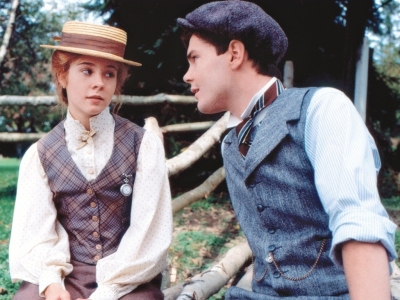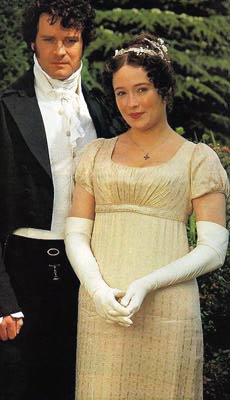Category: heroes
My Favorite Literary Couple
- Joe really respects Betsy. He doesn’t just adore her without thinking of her as a person, or think her perfection without recognizing her human flaws, or worship the ground she walks on without acknowledging that she has a brain. He respects her as a person, a human being, and he doesn’t try to shelter, coddle, or protect her. He critiques her writing honestly, and tells her real ways she can improve it. He is fiercely competitive in the first three years of their high school writing rivalry, but it is always a friendly competition.
- Although Betsy and Joe meet when they are fourteen, it is not at all certain they will end up together by the end of the series. There is an obvious attraction there, but while the reader hopes they will act on it, between their own stubbornness and outside influences, one can’t be at all sure. So that, when they do end up together, there is simultaneously a sense of “Of course!” and “Whew!”
- (and somewhat connected to 2) Because we get to see Betsy with SO many other boys, and Joe with at least one other girl, we are able to see even more clearly how perfect they are for each other, in contrast with all the other romances they’ve had.
- They are neither best friends nor bitter enemies. Nor do either of them think of the other as a sibling, while the other is hopelessly in love. Thank goodness!
- They don’t start dating (or courting, I suppose, given the era) and immediately get engaged and then married and everything is perfect. We get to see them continue to quarrel and make up, and even to break up for a time. Things aren’t perfect after they are married, either, but they meet every challenge with love and humor, and it makes them so human. In fact, everything about them is human and realistic, while still romantic enough to make the reader swoon.
Hero and Everyman
First of all, let me apologize to everyone who has posted a comment since Tuesday evening. Apparently Blogger’s “hiccup” yesterday caused it to lose all comments made on Wednesday and beyond. Grr. We had some interesting stuff going, too!
And now, on to the actual post:
Watching NCIS:LA (yes, I watch both NCIS and NCIS:LA; and no, it’s not just for the eye candy (although that doesn’t hurt)) this week, I was struck anew at the difference between the Hero and the Everyman, and how both are vital to tell a compelling story.
Ha! Bet you didn’t know one could get such revelations from NCIS, did you?
In brevis, the Hero is someone we aspire to. He or she is the one we admire, the one who shows the most praise-worthy traits, the one who gives us an example and makes us yearn to be better.
The Everyman is someone we can relate to. He or she is the one we feel akin to, we understand, we wince in sympathy, and as he or she interacts with the Hero, we get a sense of how we would interact as well. The Everyman makes the story real and personal.
Hollywood, in general, seems to get this confused. They try to make the Hero and the Everyman the same character. This might work in a few cases, but usually just ends up leaving the audience with nothing and no one to aspire to. We, as a society, need True Heroes. Tortured heroes, after a while, get old.
Many high fantasies have the opposite problem. They have the Hero with no Everyman, which leaves the audience feeling disconnected. We as humans need someone to relate to, as well.
A good example of how this works well can be seen in the Chronicles of Narnia. In Peter, we have the Hero. One of the biggest gripes you will hear from fanfic writers is that Peter is impossible to write realistically, because he has no flaws. That’s not because he is a “Gary Stu,”but because he is a Hero. He’s the one everyone looks up to and want to be like.
The Everyman? Well, he goes by the unfortunate name of Eustace Clarence Scrubb, and when we first meet him, Lewis tells us he “almost deserved” his name. Poor Eustace is a nuisance, a pest, hates and is secretly jealous of his noble cousins, and even after he is changed still maintains his Everyman status. In The Silver Chair Trumpkin the Dwarf can’t even get his name right, first calling him “Useless,” and then wanting to know just how he is “Used to it.” When the Prince, Puddleglum, and Eustace fight the serpent, we are told that Eustace’s blow lands on the body and skitters off the scales without doing any good. He thoroughly enters into every adventure, but doesn’t have any special skill that makes him unique or special.
By The Last Battle he has grown, even to the point where he can fight alongside the King (another Hero), but he is still the Everyman, just doing his best with his limited abilities. It is Jill who has the special ability to move almost unseen through the woods, Jill who rescues Puzzle, Jill who is the lone archer during that last battle, where Eustace is the first one captured and thrown in the stable. Eustace is never made a king, unlike his cousins. He is never referred to as “lord,” as Digory is (and both Polly and Jill, it seems, become “Lady” without any difficulty in the matter). He is just Eustace throughout, growing into a loyal Friend of Narnia, and giving his all without ever having anything special to give.
(In case you can’t tell, Eustace is my absolute favorite character from the Narnia series.)
In NCIS:LA, which started this whole train of thought, Callen and Sam act as the Heroes (Sam as the True Hero; Callen gets to be the Tragic Hero). The rest of the team is heroic in its own way, too, and it isn’t until Deeks comes along from the LAPD that we get a more human character. Deeks is brave enough, and good at his job, but he isn’t exactly the super-dooper expert at anything like the rest. He even looks more ordinary: scruffy, regular build, etc. Through his interaction with the team, and how he slowly integrates with them and develops his own set of skills has been one of the reasons I keep watching the show. That, and it’s fun to watch things blow up.
There are, of course, a lot of ways you can play with The Hero and Everyman roles, to expand them a bit. Take Tolkein’s Lord of the Rings as a classic example. There you have:
Aragorn – True Hero
Boromir – Guy who thinks he’s the hero, but weakly gives in to temptation.
Faramir – Guy who also thinks Boromir’s the hero (and he isn’t), but doesn’t give in to temptation, thus qualifying himself for the role of Lesser Hero.
Frodo – Everyman who grows into the Hero by the end. Those are also becoming more common (and one of my favorite characters to write), and are also important for humans – because we need to see that ordinary people can grow to do extraordinary things.
Sam – Everyman
Then, of course, you have Eowyn (I think Eomer comes under the Lesser Hero category), who plays a similar role to Edmund in the Chronicles of Narnia. They both start out wanting to be the True Hero, but by the end have accepted a subordinate role quite happily – Eowyn as a Healer and wife to the Steward, and Edmund as ruler equal to his sisters, and under his brother. Lucy and Susan, in CoN, have their own roles as well, of course, but those are slightly harder to define. Lucy is Inspiration, and Hero, and Joy, and Faith, and … well, she’s Lucy. Susan is more akin to Boromir (HEY – fanfic crossover with a Susan/Boromir pairing, anyone?), in that she starts out heroically but gives in to her weak points. Unlike Boromir, who dies for his transgressions, we are allowed to hope, at the end of the CoN, that Susan may yet repent and attain the role of Restored Hero.
To return to the initial idea of Hero and Everyman – I think it helps, as a writer, to define these roles. Not that your characters have to fit exactly into a mold, but in a world where anti-heroes are frighteningly popular, and the everyman, if he exists in the story at all, is either a joke or a cynic, I think it is important to remember why these types of characters are so enduring. As I said in the beginning: We need to have someone to aspire to, and we need someone to relate to. Those two desires are part of what makes us human, and it’s part of what most stories, I think, are trying to tap.
After all, there’s a reason why classic hero stories are classic. There’s a reason why NCIS and NCIS:LA are so incredibly popular.
It’s because they touch on the universal needs and desires we all share, to have a hero, and to try to grow into one ourselves, even though we are just ordinary people.
Are there other great examples of Hero and Everyman in literature or television/movies I missed? I know I only touched on a couple. Who is one of your favorite Hero characters, and one of your favorite Everyman characters? Do you think my understanding of why these characters are so important is accurate, or would you disagree? What are some other characters that are important to us as humans? And are you a fan of the NCIS shows, too?








